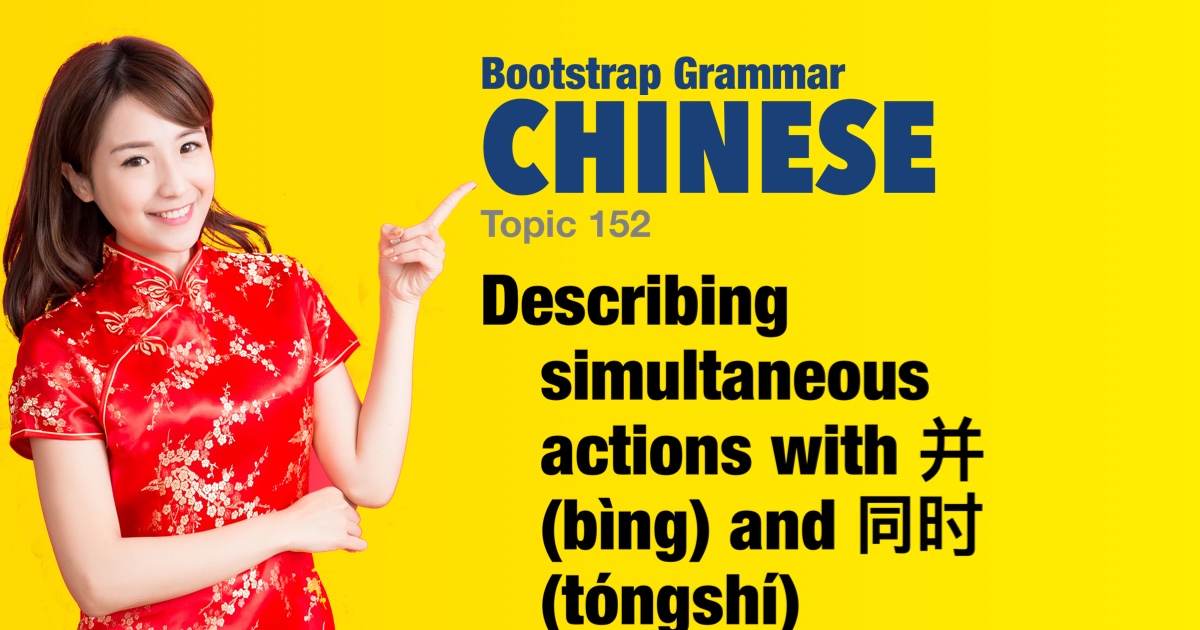Chinese grammar - Describing simultaneous actions with 并 (bìng) and 同时 (tóngshí) |
|||
|
|||
The particle 并 (bìng) and the adverb 同时 (tóngshí) are used to describe actions happening at the same time or actions that are linked. 并 is often used for emphasis, and 同时 explicitly states simultaneity. — This is like 'and also' or 'simultaneously' in Engliah. The pattern is: [subject] + [verb 1] + 并且 (or) 同时 + [verb 2]. |
| Examples: | |
|
他吃饭的同时看电视。
tā chīfàn de tóngshí kàn diànshì. He eats while watching TV.
|
|
|
我在学习的同时听音乐。
wǒ zài xuéxí de tóngshí tīng yīnyuè. I listen to music while studying.
|
|
|
她在和我说话,同时还能写信。
tā zài hé wǒ shuōhuà,#tóngshí hái#néng xiěxìn. She talks to me while also being able to write letters.
|
|
|
他们正在开会,并且认真地做着笔记。
tāmen zhèngzài kāihuì,#bìngqiě rènzhēn de zuòzhe bǐjì. They are having a meeting and taking notes seriously.
|
|
|
我们在一起吃饭,并且开心地聊天。
wǒmen zài yìqǐ chīfàn,#bìngqiě kāixīn de liáotiān. We eat together and happily chat.
|
|
|
他喜欢在看书的同时听音乐。
tā xǐhuān zài kànshū de tóngshí tīng yīnyuè. He likes to listen to music while reading.
|
|
|
我每天都工作,并且还要照顾孩子。
wǒ měitiān dōu gōngzuò,#bìngqiě háiyào zhàogù háizi. I work every day and also have to take care of the children.
|
|
|
他在院子里喝茶,并且惬意地读着报纸。
tā zài yuànzi lǐ hē#chá,#bìngqiě qièyì de dúzhe bàozhǐ. He drinks tea in the yard and reads the newspaper comfortably.
|
|
|
我们在教室里做作业,并且一起讨论遇到的问题。
wǒmen zài jiàoshì lǐ zuò#zuòyè,#bìngqiě yìqǐ tǎolùn yùdào de wèntí. We do homework in the classroom and discuss the problems we encounter together.
|
|
|
他忙着给同事打电话,并且还在给客户写电子邮件。
tā mángzhe gěi tóngshì dǎ#diànhuà,#bìngqiě háizài gěi kèhù xiě diànzǐ#yóujiàn. He is busy calling colleagues and also writing emails to clients.
|
|
|
他们听着音乐的同时欢快地跳舞。
tāmen tīngzhe yīnyuè de tóngshí huānkuài de tiàowǔ. They dance happily while listening to music.
|
|
|
我把读书当作休闲活动,并且从中学习新词。
wǒ bǎ dúshū dāngzuò xiūxián huódòng,#bìngqiě cóngzhōng xuéxí xīn cí. I take reading as a leisure activity and learn new words from it.
|
|
|
他坚持写作,并且喜欢画画。
tā jiānchí xiězuò,#bìngqiě xǐhuān huàhuà. He persists in writing and also likes drawing.
|
|
|
你们是否经常一起工作,并且每次都会提前做计划?
nǐmen shìfǒu jīngcháng yìqǐ gōngzuò,#bìngqiě měicì dōu huì tíqián zuò jìhuà? Do you often work together and plan ahead each time?
|
|
|
我们要努力学习,并且尽可能帮助别人。
wǒmen yào nǔlì xuéxí,#bìngqiě jǐn#kěnéng bāngzhù biérén. We need to study hard and help others as much as possible.
|
|
 |
|



